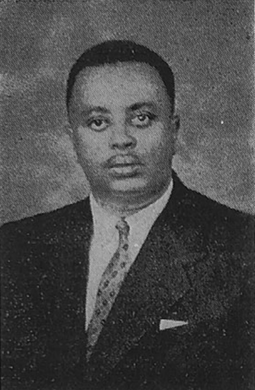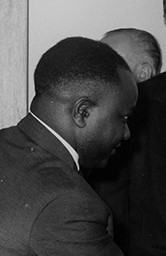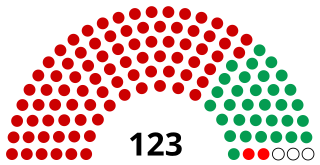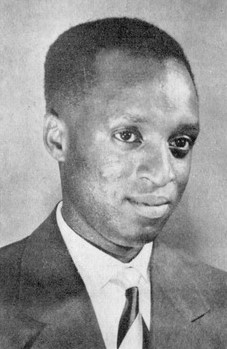Defunct political alliance in Burundi
 |
|---|
Judiciary |
|
United Nations in Burundi |
The Common Front (French : Front Commun) was a political alliance in Burundi.
 |
|---|
The Common Front (French : Front Commun) was a political alliance in Burundi.
The Common Front was established in 1960 as an alliance of the Party of the People (PP), the Christian Democratic Party (PDC), the Democratic and Rural Party, the People's Emancipation Party, the Murundi People's Voice and several other smaller parties. [1] Based on the local election results in 1960, the Front supplied assigned eight of the ten delegates to a conference in Ostend, Belgium in January 1961, with the Union for National Progress (UPRONA) supplying the other two. [2]
In the September 1961 parliamentary elections the alliance won six seats, of which the PP took four, but was heavily beaten by UPRONA, which won 58 seats. [3]
The PP contested the 1965 parliamentary elections alone, winning 10 seats in the National Assembly and none in the Senate, whilst UPRONA won 21 seats in the National Assembly and 12 in the Senate.

Prince Louis Rwagasore was a Burundian prince and politician, who was the second prime minister of Burundi for two weeks, from 28 September 1961 until his assassination on 13 October.

The Union for National Progress is a nationalist political party in Burundi. Initially it emerged as a nationalist united front in opposition to Belgian colonial rule but subsequently became an integral part of the one-party state established by Michel Micombero after 1966. Dominated by members of the Tutsi ethnic group and increasingly intolerant to their Hutu counterparts, UPRONA remained the dominant force in Burundian politics until the latter stages of the Burundian Civil War in 2003. It is currently a minor opposition party.

Pierre Ngendandumwe was a Burundian politician. He was a member of the Union for National Progress and was an ethnic Hutu. On 18 June 1963, about a year after Burundi gained independence and amidst efforts to bring about political cooperation between Hutus and the dominant minority Tutsis, Ngendandumwe became Burundi's first Hutu prime minister. He served as prime minister until 6 April 1964 and then became prime minister again on 7 January 1965, serving until his death. Eight days after beginning his second term, he was assassinated by a Rwandan Tutsi refugee.

Parliamentary elections were held in Burundi on 29 June 1993. They were the first multi-party parliamentary elections since 1965, and followed the approval of a new constitution in a referendum in 1992. The result was a victory for the Front for Democracy in Burundi, which won 65 of the 81 seats.

The National Assembly is the lower chamber of Parliament in Burundi. It consists of 100 directly elected members and between 18 and 23 co-opted members who serve five-year terms.

The Senate is the upper chamber of Parliament in Burundi. It consists of between 39 and 56 members who serve 5-year terms. The current Senate was elected on 20 July 2020 and consists of 39 members.

Joseph Bamina was a politician serving as President of the Senate of Burundi when he was assassinated. He had been prime minister for less than a year, member of the Union for National Progress party. He and other Burundian leaders of the government were assassinated on 15 December 1965, by Tutsi soldiers during a reprisal effort to stop a coup by Hutu officers.

Léopold Bihumugani (1919–2003), better known as Léopold Biha, was a Burundian politician who served as Prime Minister of Burundi from 13 September 1965 until 8 July 1966. An ethnic Ganwa born to a chief in Ruanda-Urundi, he became a close confidant of Mwami Mwambutsa IV in the 1940s after being given charge of a chiefdom which included some of the monarch's property. In the late 1950s he became involved in the Union for National Progress (UPRONA) party as the Belgian colonial administration prepared to grant Burundi its independence. Biha left the party after becoming disenchanted with leader Louis Rwagasore's populist style, and held different roles in transitional governments. He created a new party, Burundi Populaire, but failed to get elected to office and was appointed private secretary to the Mwami after independence.
André Muhirwa was a Burundian politician who served as prime minister of Burundi from 1961 to 1963. He became prime minister following the assassination of his predecessor, Louis Rwagasore. A member of the Union for National Progress (UPRONA), he previously served as Minister of the Interior from September to October 1961.

Parliamentary elections were held in Burundi on 18 September 1961 to elect all 64 members of the National Assembly and a government to lead the country following its independence from Belgium in 1962. With 75% voter turnout, the elections resulted in a victory for the Union for National Progress (UPRONA) led by Louis Rwagasore, which received over 80% of the vote and won 58 seats. Rwagasore became prime minister in the new government, but he was assassinated two weeks after the elections.

The Party of the People was a Hutu political party in Burundi.

The Christian Democratic Party was a political alliance in Burundi.

Parliamentary elections were held in Burundi on 29 June 2015. The vote had been initially set for 5 June 2015, alongside local elections, but it was delayed due to unrest. Indirect elections to the Senate occurred on 24 July.

An attempted coup d'etat in Burundi took place between 18–19 October 1965, when a group of ethnic Hutu officers from the Burundian military and gendarmerie attempted to overthrow Burundi's government. The rebels were frustrated with the king (mwami) of Burundi, Mwambutsa IV, who had repeatedly attempted to cement his control over the government and bypassed parliamentary norms despite Hutu electoral gains. Although the prime minister was shot and wounded, the coup failed due to the intervention of a contingent of troops led by Captain Michel Micombero.

Paul Mirerekano was a Burundian politician. Ethnically Hutu, he worked as an agronomist for the Belgian colonial administration in Ruanda-Urundi before starting a successful market garden in Bugarama. Politically, he was a nationalist, monarchist, and advocate for Hutu civil rights. He was a leading member of Louis Rwagasore's political party, the Union for National Progress (UPRONA), and in 1961 served as the organisation's interim president. Rwagasore's assassination in 1961 fueled a rivalry between Mirerekano and Prime Minister André Muhirwa, as both men claimed to be the heirs to Rwagasore's legacy and sought to take control of UPRONA. The controversy led to the coalescing of two factions in the party, with Mirerekano leading what became known as the Hutu-dominated "Monrovia group". His criticism of Muhirwa and his successor led him to be arrested on several occasions, but in 1965 he was elected to a seat in the National Assembly representing the Bujumbura constituency. The body subsequently elected Mirerekano its First Vice-President on 20 July. In October Hutu soldiers launched a coup attempt which failed, but led to the outbreak of ethnic violence. The government believed Mirerekano helped plan the coup attempt and executed him. His reputation remains a controversial subject in Burundi.

Joseph Biroli-Baranyanka or Joseph Biroli was a Burundian politician and was the first Burundian to receive a university education. Born in 1929 to a prominent chief, he was a Ganwa of the Batare clan. He performed well as a student and earned a diploma from the Institut universitaire des Territoires d'Outre-Mer in 1953. After continuing his education at several other universities he took up work for the European Economic Community. In 1960 his brother Jean-Baptiste Ntidendereza co-founded the Christian Democratic Party, and Biroli became the party's president. His main political rival was Prince Louis Rwagasore, a Ganwa of the Bezi clan who led the Union for National Progress. Biroli was friendly to the Belgian colonial administration in Ruanda-Urundi, while UPRONA demanded immediate independence.
Jean-Baptiste Ntidendereza was a Burundian politician. A co-founder of the Christian Democratic Party, he served as Minister of Interior of Burundi in 1961. He was later convicted of conspiring to kill Louis Rwagasore, a political opponent, and publicly executed.
Thaddée Siryuyumunsi was a Burundian politician who served as President of the National Assembly from 1961 to 1965.
The 2010 Senate of Burundi sat from 2010 to 2015.
The 2020 Senate of Burundi was indirectly elected in 2020 for a five-year term.